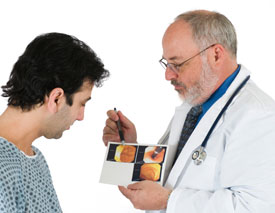 Colorectal cancer is the number two cancer killer in the United States, yet it is one of the most preventable types of cancer. Colorectal cancer – also called colon cancer – can be curable when detected early. In fact, when colon cancer is diagnosed at an early stage, the five-year survival rate is 90 percent. When the disease isn’t diagnosed until it has spread to distant organs (metastasized), the five-year survival rate drops significantly.
Colorectal cancer is the number two cancer killer in the United States, yet it is one of the most preventable types of cancer. Colorectal cancer – also called colon cancer – can be curable when detected early. In fact, when colon cancer is diagnosed at an early stage, the five-year survival rate is 90 percent. When the disease isn’t diagnosed until it has spread to distant organs (metastasized), the five-year survival rate drops significantly.
“Most early colorectal cancers produce no symptoms; that’s why screening for colorectal cancer is so important for early detection of the disease,” said Cooper University Hospital’s Thomas A. Judge, MD, Division of Gastroenterology.
Colon Polyps and Cancer
Most colorectal cancers develop from polyps, which are abnormal growths in the colon. Colon polyps are common; about 30 percent to 50 percent of adults have them. Their occurrence typically increases with age and they usually cause no symptoms. The majority of polyps aren’t cancerous (malignant). Yet like most cancers, polyps are the result of abnormal cell growth. In the colon and rectum, this unregulated growth can cause polyps to form. If polyps grow unnoticed and are not removed, they can become cancerous. Screening tests can find pre-cancerous polyps so they can be removed before they turn into cancer. In fact, studies suggest that the development of more than 75 percent to 90 percent of colorectal cancer can be avoided through early detection and removal of pre-cancerous polyps.
Screening Colonoscopy
“The preferred method of screening for colorectal cancer prevention is colonoscopy,” Dr. Judge said.
Performed while the patient is sedated, colonoscopy is a painless, out-patient procedure that allows the physician, using a colonoscope, to view the entire length of the large intestine, and identify abnormal growths, inflamed tissue, ulcers, and bleeding. The colonoscope allows the physician to see the lining of the colon, remove tissue for further examination if necessary, and possibly treat some problems that are discovered. Polyps can be completely and safely removed using a device inserted through the colonoscope at the time of the screening.
Colorectal Cancer Screening Guidelines
For average-risk individuals, a screening colonoscopy for colorectal cancer prevention is recommended every 10 years, beginning at age 50.
African Americans, who typically are diagnosed with colon cancer at a younger age than other ethnic groups and experience lower survival rates, are advised to begin screenings at age 45.
People at higher risk for developing colorectal cancer – those with a personal or family history of the disease or colorectal polyps; inherited forms of colorectal polyps or cancer; predisposing chronic digestive conditions, such as Crohn’s disease or ulcerative colitis – are recommended to get screenings at any age and interval that their physician recommends.
“Remember, colorectal cancer is most common after age 50, and the risk of developing it increases with age. Regular screenings can help protect you. Colon cancer is preventable and curable when found in its early stages,” Dr. Judge said.
The board-certified gastroenterologists of the Cooper Digestive Institute in Mount Laurel have state-of-the-art outpatient facilities dedicated to a full range of diagnostic testing, including colonoscopy screening.
